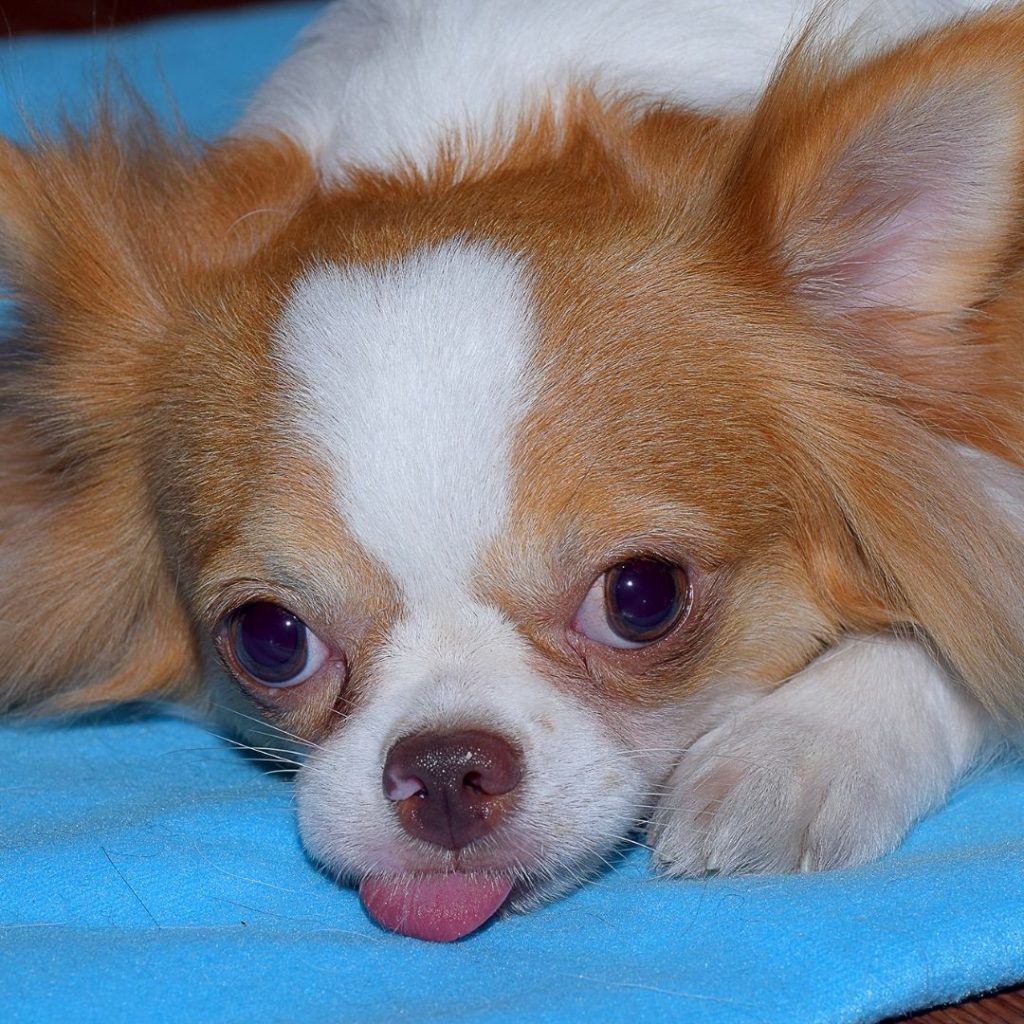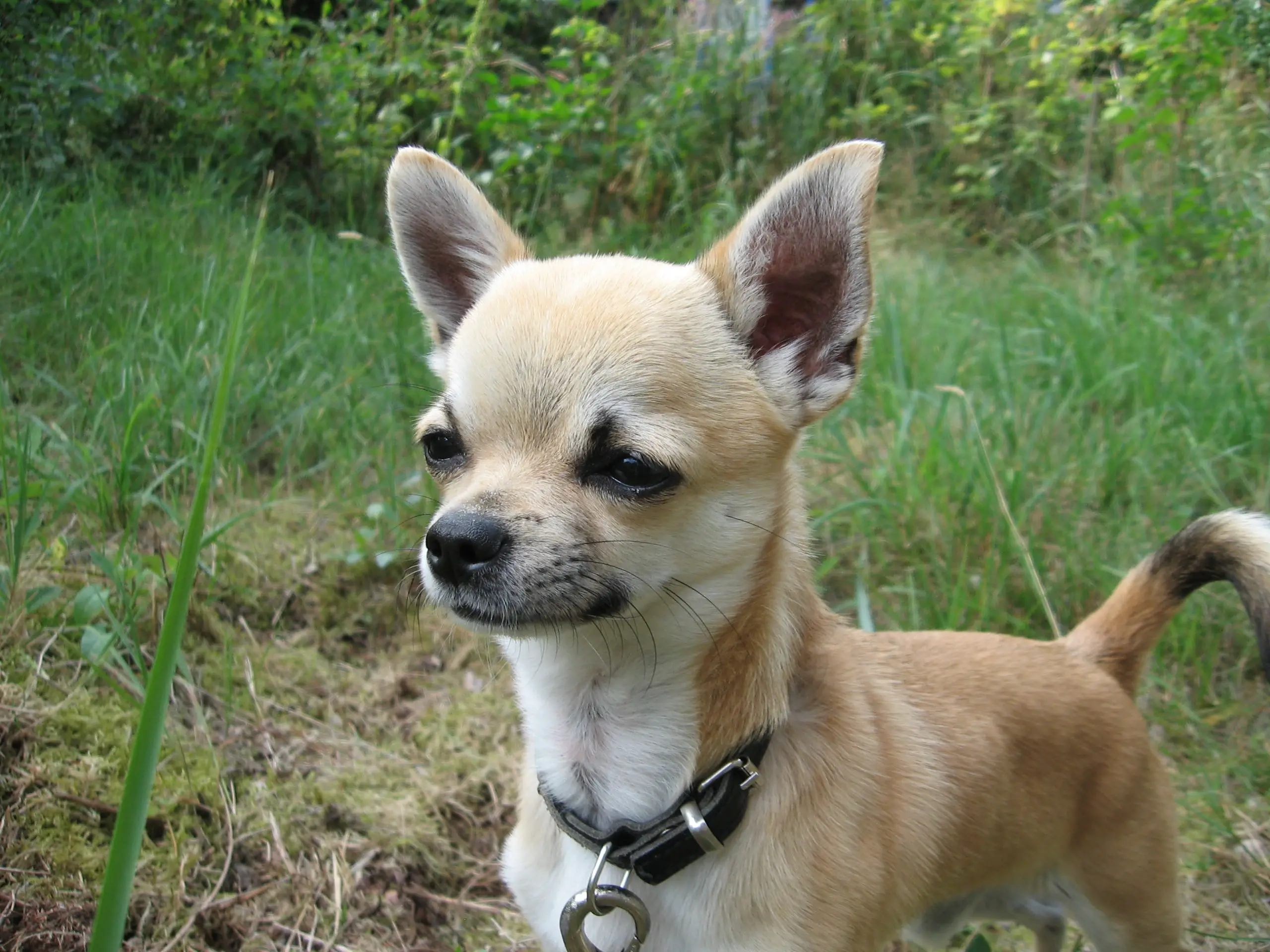What are some of the common health problems in Chihuahuas?
The good news is that Chihuahuas are generally healthy, robust, and hardy dogs but, like all dog breeds, they are prone to certain health conditions.
Not all Chihuahuas will develop any or all of these issues, but it is important as a Chihuahua owner, to be aware of them. This way, you will know what to expect, what to do, and also adopt ways to avoid some of the preventable ones.
If you are buying your Chi from a reputed breeder, you can ask for health clearance certificates from the Orthopedic Foundation for patella luxation, heart clearances, and Canine Eye Registry Foundation certificate for PRA or progressive retinal atrophy. We have discussed these health problems in the list below.
With these certifications, you can be assured of a healthy puppy having a much lower risk of developing common health problems in Chihuahuas.
12 Common Health Problems in Chihuahuas

Here is a list of common health problems in Chihuahuas that pet parents need to make themselves aware of. This will help you prepare for them better and also their early detection can help you begin treatment and take necessary precautions as well.
1. Allergies
Allergies are extremely common in Chihuahuas. They are of three types of allergies in Chihuahuas: skin, food, and environmental allergies.
Skin allergies can occur due to contact with detergents, household cleaners, flea dermatitis, or even from food intolerances. Food allergies are usually a reaction to certain protein in the dog’s food. Your veterinarian can help detect food allergies by trial and elimination process. Environmental allergens can be a reaction to pollen, dust, mold, and other environmental pollutants.
Treatment
- Eliminate food allergens through trial and error
- Provide your pet food rich in Omega essential fatty acids and vitamin E
- Use medicated or anti-allergy shampoos to bathe your Chi
- Reduce contact between your Chihuahua and allergens (mold, grass, dust, etc.)
2. Eye problems
Progressive retinal atrophy or PRA is one of the common health problems in this toy breed. The disease can cause night-blindness in the early stages and later on, some dogs even lose their daytime vision.

Fortunately, many Chihuahuas who lose their complete vision can still manage walking around the house as long as there are no changes in the layout.
It is very important to get your Chihuahua puppy from a reputable breeder since most of them get their dogs certified by Ophthalmologists and prevent breeding dogs having PRA.
Cherry eye and cataracts are other common eye problems in Chihuahuas. The American College of Veterinary Ophthalmologists have also identified other congenital eye issues in Chihuahuas like lens luxation, glaucoma, coloboma, retinal detachment, retinal dysplasia, etc.
Eye infections like keratoconjunctivitis sicca or dry eye are also common.
Treatment
- Some of these eye issues can be corrected through surgery and medications.
3. Seizures
Chihuahuas are known to suffer from seizures or epilepsy. There are many root causes and sometimes, it is hard to tell the exact cause of the epilepsy.

The first time a Chi has a seizure can be very distressing for a Chihuahua owner. But never pick up or cuddle your Chi while it is having convulsions.
Some signs of potential seizures in Chis includes shaking, whining, hiding, staring into space, and wandering restlessly. These can come on suddenly and last for hours before the actual epileptic attack occurs.
What to do
- Do not panic.
- Time the seizure for discussion with vet.
- Let your pet stop shaking – do not touch/pick it up.
- If the seizure lasts for more than 5 minutes, call your vet.
- If drop in sugar levels is the cause of seizures, keep some honey on hand. Rub a bit of honey on your Chihuahua’s gums. This will help bring your pet around. Never force it to swallow as it could choke your pet.
Treatment
Treatments for seizures and epilepsy in Chihuahuas include medicines like diazepam, bromide, and phenobarbital. Time the seizures and follow your vet’s instructions.
4. Hydrocephalus
This is one of the common health problems in Chihuahuas and other small dog breeds. It is mainly seen in dog breeds having large heads.

Hydrocephalus is the buildup of fluid in the brain. It usually occurs in Chihuahua puppy. Some puppies with mild hydrocephalus live normal lives although many do not make it to adulthood.
Symptoms of hydrocephalus include large dome-shaped head, multiple moleras soft spots on the head), slow growth rate, seizures, etc.
Treatment
- A surgical treatment is available although it is very expensive. The surgeon will put a shunt in the affected puppy’s brain to relieve pressure of fluid build-up.
5. Patella Luxation
Another common health problem in Chihuahuas is luxating patella. It is characterized by the sliding of the knee caps in the hind legs. Experts say that almost 75% of Chihuahuas are susceptible to patella luxation.
Symptoms include difficulty in walking and running, change in gait, stopping during running and stretching to make the knee cap slide back, limping, hopping, and pain.
Treatment
- Most Chihuahuas with patella luxation can still lead fairly good lives. Manage your pet’s condition with healthy food, moderate exercise, rest, and the use of orthopedic dog beds.
- These days, there are supplements available that can help improve the range of motion, mobility, and reduce further deterioration of the affected knee cap.

6. Collapsing Trachea
Some Chihuahuas suffer from respiratory difficulties due to collapsed trachea. This condition causes the rings of the trachea to fall inward. The result is pain while walking as well as difficulty in breathing.

Your Chihuahua dog might have symptoms like dry cough, shortness of breath, a snorting sound. Sometimes, reverse sneezing can also result due to a collapsed trachea.
Treatment
- The condition is manageable with medication.
- You can use a harness instead of a neck collar while walking your Chi. This will protect its delicate neck bones from injury in the event your pet pulls on the leash.
7. Obesity
Our dear Chihuahuas are so cute and affectionate that we often end up over-feeding them. Unfortunately, even a few pounds of weight gain in your Chihuahua pup is highly evident since it is a small dog.
Also, the excess weight can put tremendous load on its joints causing pain, difficulty in walking, excess appetite, lethargy, etc.
Treatment
- Feed your Chihuahua healthy meals.
- Your pet also needs daily exercise – at least 30-40 minutes each day.
8. Cardiac diseases
Many cardiac diseases in Chihuahuas are congenital in nature. This means, if your Chihuahua’s parents had heart disease, chances are it will too.

Good breeders do not breed dogs with heart diseases. Common congenital heart diseases in Chihuahuas include patent ductus arteriosis as well as valve and septular defects. Many Chihuahuas die from heart failure as well.
Treatment
- Certain heart diseases like heart murmur can be corrected with surgery or medication although there isn’t much one can do for the others like septular or valve defects.
- Prognoses range from good to serious and that is why you will have to regularly monitor your Chihuahua with ultrasound, X-rays, and EKG tests.
9. Urogenital issues (Hernias)
One of the more common health problems in Chihuahua puppies is retained testicles. Testicles may be retained anywhere along the abdomen or the inguinal canal.
Treatment
Sometimes, surgery can help however, if the testicles do not descend naturally by 6 months, they probably never will. Breeders should refrain from breeding such dogs.
10. Dental issues
If your Chi has received optimal dental care starting from puppyhood, then the likelihood of developing dental health problems can significantly decrease as your Chi ages.
This small breed dog, like other small dogs, is prone to dental disease like periodontal disease, gum disease, tooth loss, etc.

Treatment
- Prevention is better than cure when it comes to dental disease. Please maintain your pet’s oral health by providing it with dental chews and brushing its teeth regularly. Regular professional dental scaling can also help.
- In case of retained puppy teeth, see your vet to have them removed. This will prevent crowding of teeth in the mouth once the adult teeth start coming out.
11. Coughing
There are myriad reasons behind coughing, wheezing, choking, gagging, and struggling for breath. It could be reverse sneezing, collapsed trachea, kennel cough, or simply a throat infection.
See your vet if you have recently brought your Chihuahua from the kennel. Kennel cough is contagious and needs medication. You can also vaccinate your Chihuahua for kennel cough before boarding your pet.
Even without medicine, kennel cough will go away within a few days. However, in some weak or immune-compromised Chihuahuas, it could lead to pneumonia which is very serious.
Treatment
In case of coughing that lasts longer than a minute, please see your vet. This could be a potentially serious health problem that can be resolved through timely help.
12. Vomiting

It can be highly distressing to have a vomiting Chihuahua on hand. There are various causes behind vomiting so you will want to give the exact description of the time of vomiting, frequency, and also the color of the vomit so your vet can come up with accurate diagnosis.
Some Chihuahuas vomit after playing. This type of vomiting is because of excitement and you can prevent it by massaging your Chi’s throat and calming it down. It is best not to over-excite your Chi if it vomits frequently after playing.
Vomiting yellow foam
This type of vomiting occurs in the morning due to buildup of bile. In such cases, it helps to feel smaller, more frequent meals to your Chi. What you feed your Chi is important too; make sure the food is easy to digest and non-irritating.
Vomiting white foam
This type of vomiting can also occur when your Chi is hungry or its stomach is empty for a long time. Smaller, more frequent meals can prevent it.
Vomiting after every meal
Many Chihuahuas vomit after meals when they have over-eaten or eaten too fast. It is best to feed your small dog smaller-though-frequent meals.
Acute vomiting multiple times without warning
This type of vomiting is seen in Chihuahuas with indigestion. Your pet might have eaten something from the trash can or the road. It might also occur when a dog eats dry dog food too rapidly. The best thing to do is avoid feeding solid food for a few hours. Give your Chi some bland food like rice or broth. Once symptoms ease, you can go back to feeding normal food.
Sometimes, the vomiting may also be accompanied by diarrhea. If the symptoms do not ease after 2 to 3 days, please have your vet examine your Chi.
Vomiting blood
This is one of the more serious type of vomiting and you must not ignore it. Please have your vet examine your Chihuahua as soon as possible.
FAQs on Common Health Problems in Chihuahuas
1. What is the average life expectancy of a Chihuahua?
Chihuahuas live for an average of 12 to 20 years. Check out our guide on How Long Do Chihuahuas Live For? where we have discussed tips how to increase a Chi’s lifespan.
2. What illnesses are Chihuahuas prone to?
Unvaccinated Chihuahuas are prone to illnesses like parvovirus, rabies, canine corona virus, distemper, and leptospirosis. Many of these illnesses can be prevented by following the proper Chihuahua puppy vaccination schedule.
3. Which is the healthiest dog breed and which breed has most health problems?
Australian cattle dog breed is considered one of the healthiest dog breeds. The breed with most health problems is the Cocker Spaniel followed by German shepherd, Bulldog, and Golden Retrievers.
Conclusion – Common Health Problems in Chihuahuas
Chihuahuas are prone to health problems like cardiac issues, allergies, obesity, eye problems, dental issues, and patella luxation.
Not all Chihuahuas will develop these problems but it is very important to buy your Chihuahua pup from a reputed breeder. You can also prevent some of the aforementioned common health problems in Chihuahuas through healthy diet, daily dental care, regular exercise, and frequent vet checkups.


